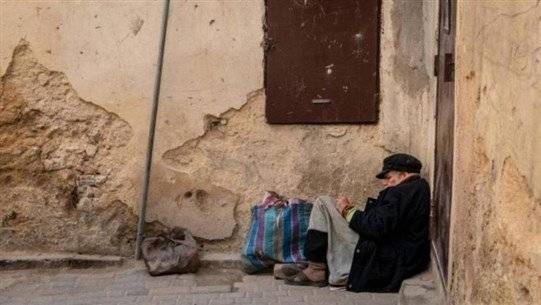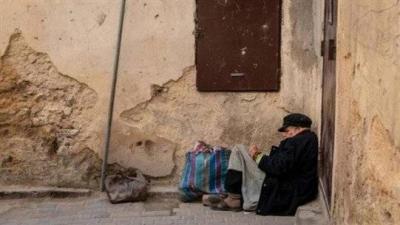The policies aimed at combating poverty have removed citizens from under the direct control of political parties, leaving them "under the gutter" of clientelism when seeking social assistance. Financial contributions have been limited to a fifth of the population, with 80 percent living below the poverty line, thus opening the floodgates to nepotism and creating a vast operation of "patronage" to secure even the simplest "rights." A study conducted in early 2020 aimed to secure $1.2 billion in social funding to compensate 750,000 families for a year due to subsidy cuts but has gradually declined. In July 2021, Parliament approved a law for a financial card designated for 505,000 families at a cost of $556 billion. Faced with the inability to secure funding, assistance was again restricted to only 225,000 families under the "Social Safety Net" (Aman) and "Support for the Poorest Families" (NPTP) programs, primarily funded by the World Bank at a value of $246 million and other international entities.
The number of actual beneficiaries from the official assistance provided through "Aman" and the program for the poorest families will not exceed 200,000, representing less than 20 percent of the total population. This situation forces a significant portion of the newly poor, estimated at 60 percent, to seek intercession from their sectarian references, either to be included in social programs or to request health, educational, nutritional, and living assistance to help them endure. This reality became glaringly evident in recent months with the "National Social Solidarity Program," as highlighted in the paper "Exploiting Poverty: Municipalities and Targeted Assistance Requests." It noted that "municipalities authorized to register submitted about 500,000 requests for assistance since launching the form on the designated platform in April 2020." Significantly, according to the paper, "municipalities controlled by traditional parties, particularly the Shiite duo, submitted the largest number of assistance requests." This indicates, according to the paper, that "the distribution based on clientelism through government channels remains a primary goal for political parties, even if informal channels were created when public resources dried up."
The middle class joins the ranks of those in need
This reality, which started to tighten with increasing external pressure, particularly regarding controlling the distribution mechanisms of World Bank assistance, based on official statements, is not likely to end entirely and may take various forms. "Clientelism will increase as citizens are becoming more in need of assistance," says Dr. Sami Atallah, Executive Director of the Lebanese Center for Studies. Perhaps the most dangerous aspect of the new clientelism is "the inclusion of part of the middle class among those needing the assistance of politicians after being self-sufficient in the past." According to Atallah, "the increase in poverty rates from 30 percent to around 80 percent serves as an additional impetus for increasing patronage rates."
Achieving Political Goals
The ongoing and accelerating collapse over the past three years has provided an opportunity for the system to strengthen its position in the prevailing clientelist system, even at the expense of the "death" of the country and its citizens. "Instead of intervening with radical reform measures, the system stood by and watched the collapse," Atallah states. It not only refused to adopt the required reform measures but also pursued contradictory policies that bolstered the positions of influential and wealthy individuals at the expense of the rest of society. It is known that the remedial prescriptions are not hidden from anyone. Calls for their implementation have echoed both internally and externally. Accordingly, the system has taken advantage of the vulnerability and needs of weaker segments to achieve its political ends. It has indeed succeeded in disrupting all proposed rescue initiatives and emptied the few approved reform laws of their substance; the abandonment of the financial card is the best testament to this.
The problem started with subsidies
The inability of more than two-thirds of society to live without social assistance is the most pressing problem. Whether citizens are beholden to politicians for marginal assistance or reliant on the state merely to "breathe," "the matter becomes insignificant," according to researcher Karabid Fikrajan from the Lebanese Institute for Market Studies (LIMS). "Exploiting public funds in such an overt manner—taking from one group to give to another, or even taking from the poor group with one hand to give to the same group with the other—is unjustifiable. In all cases, the need for direct support through financial cards would not have arisen, in his opinion, "had it not been for the initiation of a misguided subsidy policy that cost the economy over $18 billion in hard currency. These measures ostensibly aimed to help the poor but essentially served the interests of large importers, stockpilers, and smugglers. They lost depositors their money and impoverished citizens further."
The Customs Dollar Absorbs Assistance
Despite the bleak overall picture, the "hope for rescue and freeing citizens from the "sea" of poverty and need remains possible," from Fikrajan's viewpoint. He believes it only requires "the will" (political will) and the enactment of technical measures related to correcting monetary policy, liberating the market from monopolies, especially those tied to the state, and adopting incentive tax policies… to mention just a few." However, instead, the exact opposite is happening. Social assistance provided by the state is set to decrease significantly with its intention to raise the customs dollar to 20,000 lira or even more. According to Fikrajan, the solution to this dilemma is to "eliminate all customs duties and not increase them, as this would not only secure substantial income for citizens commensurate with the claimed increases but would also stimulate the economy and mitigate the injustice faced by legitimate production, service, and trading sectors that declare their imports and profits."
In addition to radical economic reforms, there is a pressing need now more than ever for comprehensive and equitable social policies that allow citizens to distance themselves from sectarian alignments and dependencies.




